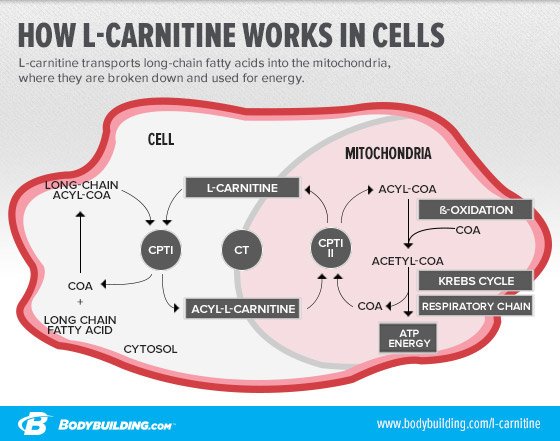How Long Does It Take For L Carnitine To Work

L-Carnitine, a popular supplement often touted for its potential benefits in weight management and athletic performance, has users and researchers alike wondering: how long does it truly take to experience its effects? The answer, it turns out, is complex and varies based on individual factors and the specific benefits being sought.
The timeframe for L-Carnitine to produce noticeable results is not uniform. Several elements like dosage, individual metabolism, the specific form of L-Carnitine used, and the intended outcome all play a crucial role. Understanding these factors is key to managing expectations and optimizing supplementation strategies.
Understanding L-Carnitine and Its Mechanisms
L-Carnitine is a naturally occurring amino acid derivative that plays a vital role in energy production. It transports fatty acids into the mitochondria, the powerhouses of cells, where they can be burned for fuel. This process is crucial for energy metabolism and is the primary reason L-Carnitine is often associated with fat loss and enhanced physical performance.
The body naturally produces L-Carnitine, but supplementation can increase its availability, especially for individuals with certain medical conditions or those engaged in intense physical activity. Supplementation aims to boost carnitine levels in muscles, which can potentially enhance fat oxidation and reduce muscle fatigue.
Factors Influencing the Timeline
Dosage is a significant factor. Studies often use dosages ranging from 1 to 3 grams per day, with higher doses potentially leading to faster results, but also potentially increasing the risk of side effects. It’s crucial to consult with a healthcare professional to determine an appropriate and safe dosage.
Individual metabolism greatly affects how quickly L-Carnitine is absorbed and utilized by the body. Factors such as age, genetics, and overall health can influence metabolic rate and, consequently, the timeline for experiencing benefits.
The form of L-Carnitine used also matters. Acetyl-L-Carnitine (ALCAR), for instance, is often preferred for cognitive benefits because it can cross the blood-brain barrier more effectively than other forms. L-Carnitine L-Tartrate, on the other hand, is commonly used to enhance athletic performance and muscle recovery.
The intended outcome influences the perceived timeframe. If someone is taking L-Carnitine for weight management, it might take several weeks or even months, combined with diet and exercise, to see significant changes. However, if it's for muscle recovery after intense workouts, benefits might be noticed within days.
Research Findings on L-Carnitine's Timeframe
Studies investigating L-Carnitine's impact on athletic performance often report improvements in muscle recovery and reduced muscle soreness within a few days to weeks. A study published in the Journal of Strength and Conditioning Research indicated that L-Carnitine L-Tartrate supplementation helped reduce muscle damage and soreness after eccentric exercise after just a few days.
Regarding weight management, research suggests that consistent supplementation for several weeks or months, combined with a calorie-controlled diet and regular exercise, may lead to modest weight loss. A meta-analysis published in the journal Obesity Reviews found that L-Carnitine supplementation was associated with a small but significant reduction in body weight, but the effects were more pronounced when combined with lifestyle interventions.
For cognitive benefits, particularly with Acetyl-L-Carnitine (ALCAR), some studies have shown improvements in memory and cognitive function within a few weeks. However, these studies often involve individuals with cognitive impairments or age-related cognitive decline.
Potential Side Effects and Considerations
While L-Carnitine is generally considered safe for most people, it can cause side effects in some individuals. These may include nausea, stomach cramps, vomiting, and diarrhea. Rare but more serious side effects include increased heart rate and blood pressure.
It’s crucial to consult with a healthcare professional before starting L-Carnitine supplementation, especially for individuals with pre-existing medical conditions or those taking medications. Certain medications, such as blood thinners, can interact with L-Carnitine.
Dosage and Timing Recommendations
The optimal dosage of L-Carnitine varies based on individual needs and the specific form of the supplement. A typical dosage range is 1 to 3 grams per day, divided into multiple doses. It is often recommended to take L-Carnitine with food to enhance absorption. For athletic performance, taking it before or after workouts might be beneficial.
Conclusion: Patience and Consistency are Key
Determining how long it takes for L-Carnitine to work depends on various factors, including dosage, individual metabolism, the form of L-Carnitine, and the intended outcome. While some benefits, such as improved muscle recovery, may be noticeable within days or weeks, others, like weight loss, may require several months of consistent supplementation combined with lifestyle modifications.
Patience and consistency are crucial when supplementing with L-Carnitine. It's important to manage expectations and understand that L-Carnitine is not a magic bullet but rather a supplement that can potentially support specific goals when combined with a healthy lifestyle.
Ultimately, consulting with a healthcare professional or a registered dietitian is essential to determine the appropriate dosage and to ensure that L-Carnitine supplementation is safe and effective for individual needs.


















